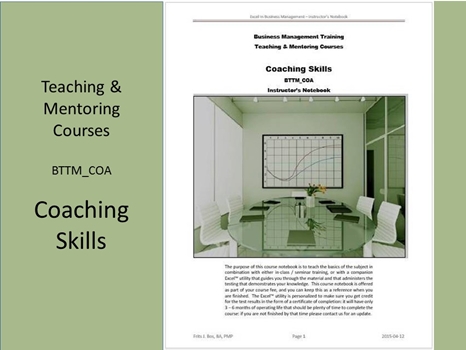
Coaching Skills BTTM_COA
Coaching is based on working closely with an individual to help them improve their abilities, with the assumption that they already know what they need to know. The athletic coach cannot give an athlete the capabilities that have to be innate, but they can give the athlete feedback on their technique to make them better in many different respects. The coach does not have to be a top athlete in their own right, but they have to understand what the athlete needs to get better. In business, or in life skills, coaching involves a similar role of helping clients become better at what they do. Many people have abilities but are hesitant to move forward without reassurance, and a skillful coach can provide the encouragement and point at accomplishments to help them get on with life or flourish in their career. The importance of coaching is that at some point clients must be expected to progress independently, rather than to become dependent on the coach.
Coaches normally do not show their client how to perform specific tasks but they may review or comment on the performance and suggest ways in which the client can do better. They help the client review their accomplishment, help draw up action plans, and follow-up to make sure that the action plans are implemented. Coaching can cover a much broader range of professional or personal needs and range from a formal, professional arrangement to an informal relationship between two people, of whom one has more experience and expertise than the other and offers advice and guidance as the other learns. This differs from mentoring by focusing on competency in specific skills or tasks, as opposed to general overall development that a mentor provides.
Sometimes people have to switch coaches: this is common practice in losing sports teams where a different perspective may motivate the team to try different things and, hopefully, achieve the wins they are after. Coaches use different styles, such as asking questions and finding ways to challenge the learner to devise their own answers, so as to develop new ways of performing based on their own perspectives. Coaching has evolved through various fields of study including personal development, adult education, psychology (developmental, organizational, clinical, sports, social and industrial) and organizational or leadership theories and practices, and became an independent discipline, governed by different types of associations. Traditionally sports coaching was (and often remains) a skills-based learning experience from a master in the sport, while other coaching includes life coaching, emotional intelligence coaching, executive coaching, and wealth coaching. Coaching is the art of helping people to identify skills and capabilities that are within their grasp and enabling them to use them to the best of their ability. Areas that are covered in our training programs include:
Financial coaching focuses on helping clients to attain specific financial goals and aspirations. In our course programs we cover financial coaching opportunities to provide encouragement and support for the client's financial plans. Incorporating goal setting, budgeting, expenses tracking, asset protection, retirement planning, powers of attorney, and last will and testament, our primary focus is on creating an integrated financial picture. If the goal is to invest in real estate, we also have a real estate purchase planning process to cover off the most common coaching needs. In this process the coach compensates for the tendency of people to procrastinate and focus on short-term gains over long-term wellbeing. The coach can monitor how clients progress over time and keep the client informed of progress or lack thereof, but they cannot make the client succeed. People are more likely to stick to a plan if they are monitored by others, whereas self-monitoring tends to be ineffective, but that is not the guaranteed outcome. Financial coaches do not need to be experts in personal finance because they do not focus on providing financial advice or information to clients.
Life coaching draws upon a variety of tools and techniques from other disciplines. The objective is to help people identify and achieve personal goals – many life coaches have studied psychology and have formal training in counseling, but for general support roles there is no need for life coaches to actually be therapists. The key is to understand the boundaries of what advice they can provide and focus on a particular domain knowing that if the client needs other help they will have to switch coaches. For many life coaching situations the client simply wants a sympathetic ear and /or a devil’s advocate who helps to confirm that the client has thought through all aspects of what they want to do. For example, exploring different career fields and trying to determine what makes different options more or less attractive, as well as confirming that the client is prepared to do what it takes to get the right education to qualify. It is important to stay clear of performing “psychotherapy” without a license, or get involved in other very sensitive areas like personal, marital, or family counseling by starting to give advice or prescribing action when they are not mental health professionals.
Business coaching provides positive support, feedback and advice to clients to improve their personal effectiveness in the business setting. There is no certification required to be a business or executive coach, which makes it a practical role to play based on the business training programs we provide: many entrepreneurs are so busy that they gladly outsource many of the planning and evaluation activities we cover in the business courses, such as building custom marketing plans or business plans. You can avoid confusion by referring to the role as that of a consultant, which incorporates the broader scope of doing some of the work rather than simply counseling. Since these kinds of tasks are a specialized skill it often makes more sense for clients to hire someone who does this work on a regular basis than to dabble in it after taking courses that they barely have time to devote to. We regard business coaching as based on a foundation of practical and focused business planning to bring a disciplined methodology, especially for small businesses where business coaching aims to drive profit while developing a client.
Executive coaching is focused on professional and personal development to achieve individual growth, improved performance and job satisfaction. Generally the coach tries to stimulate the client's way of looking at things by posing thoughtful questions and/or devising "exploratory experiments" with written product or "experiments" like simulations we introduce in our business courses to consider a range of “What If” scenarios that could be damaging if attempted in the real world. The outcome of these types of initiatives represents experiential learning and development of new approaches to situations. In order to perform this kind of consulting coaches must have a strong understanding of how different workplaces operate and adapt their coaching style or strategies to the environment in which a client must function. If not, coaches who do not sense these differences can do actual damage by using a “one size fits all” approach. Coaches must also consider motivational needs and cultural differences that may limit what options might be considered. The nature of executive coaching involves working to achieve specific professional goals like (personal) career management, communication, performance and organizational effectiveness, enhanced strategic thinking, conflict resolution, and team building.
Learning Formats BTTM_COA
This course is currently available in a classroom setting (public or company private) with approximately 15 contact hours.
PDF – Certificate Of Completion
Each course offers a certificate of completion that identifies the course, the student, and a brief description of the course. To receive a certificate the student must have attended at least 80% of the course sessions. This personalized certificate is forwarded to the student by Email.
PDF – Course Notebook
Each course includes a notebook in PDF format that provides the minimum knowledge the student must master in order to obtain the certificate. In the notebook you will find references to other study materials. Students receive the notebook by Email when their registration is confirmed.
PDF – Program Overview
An overview of this study program can be downloaded from the website by right-clicking on the program link on the enquiry page.
PDF – Current Training Schedule
A list of upcoming training sessions can be downloaded from the website by right-clicking on the schedule link on the enquiry page.
Registration – Service Providers
To register for any training course please look on the enquiry link page of your service provider (from where you accessed this website). On the page you will find a registration request form where you can order the course that you are interested in. The availability dates will be provided to you, along with payment instructions if you decide to go ahead.

 |
|